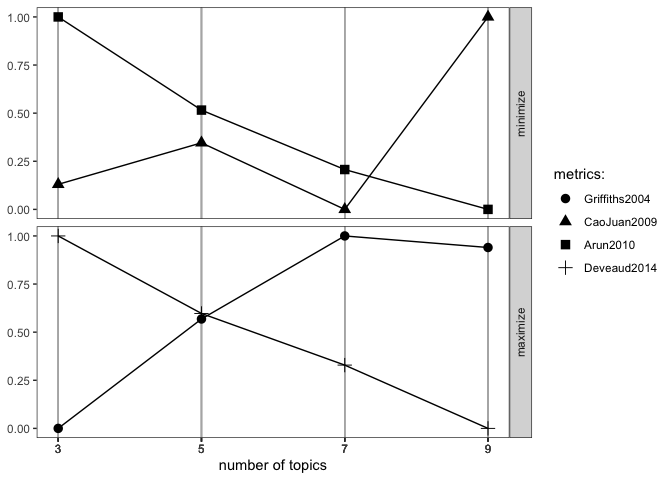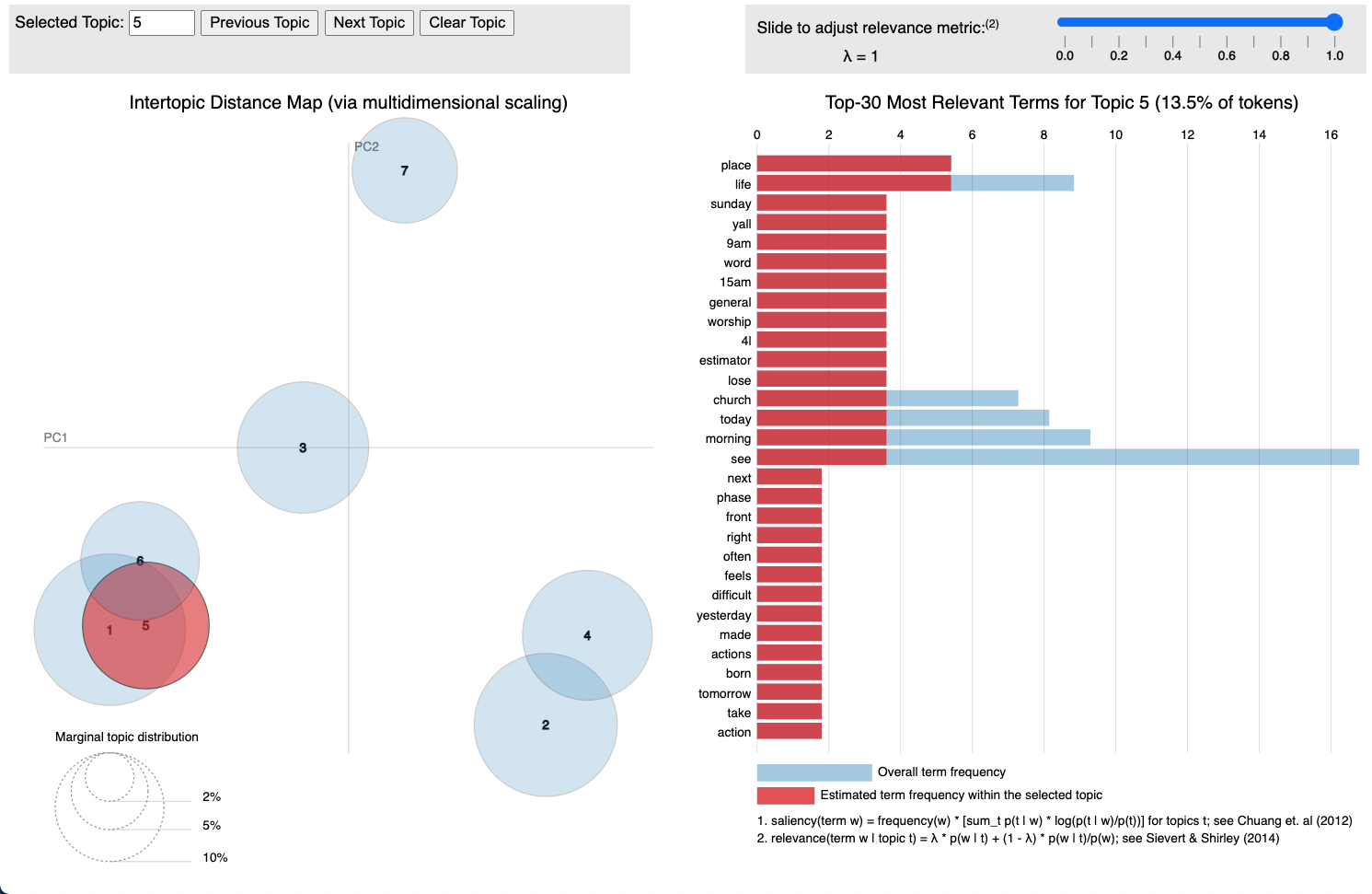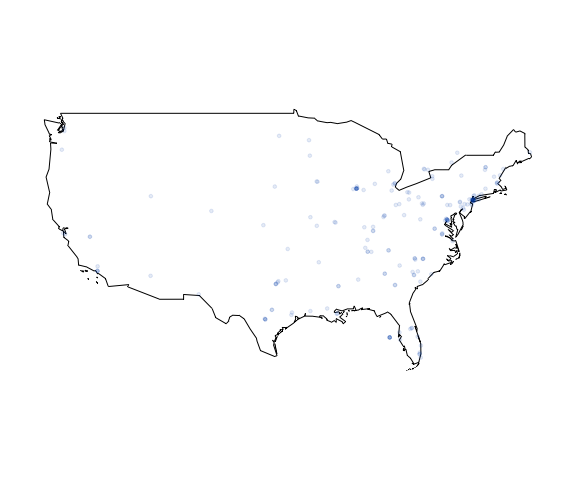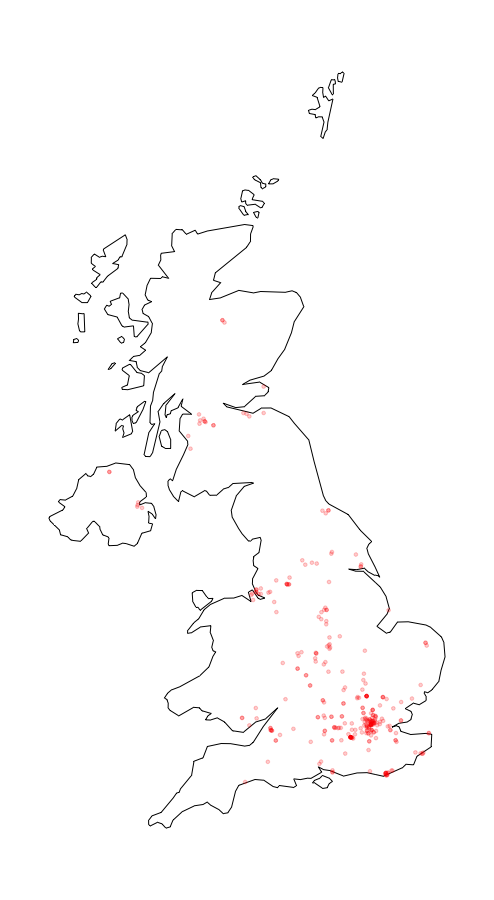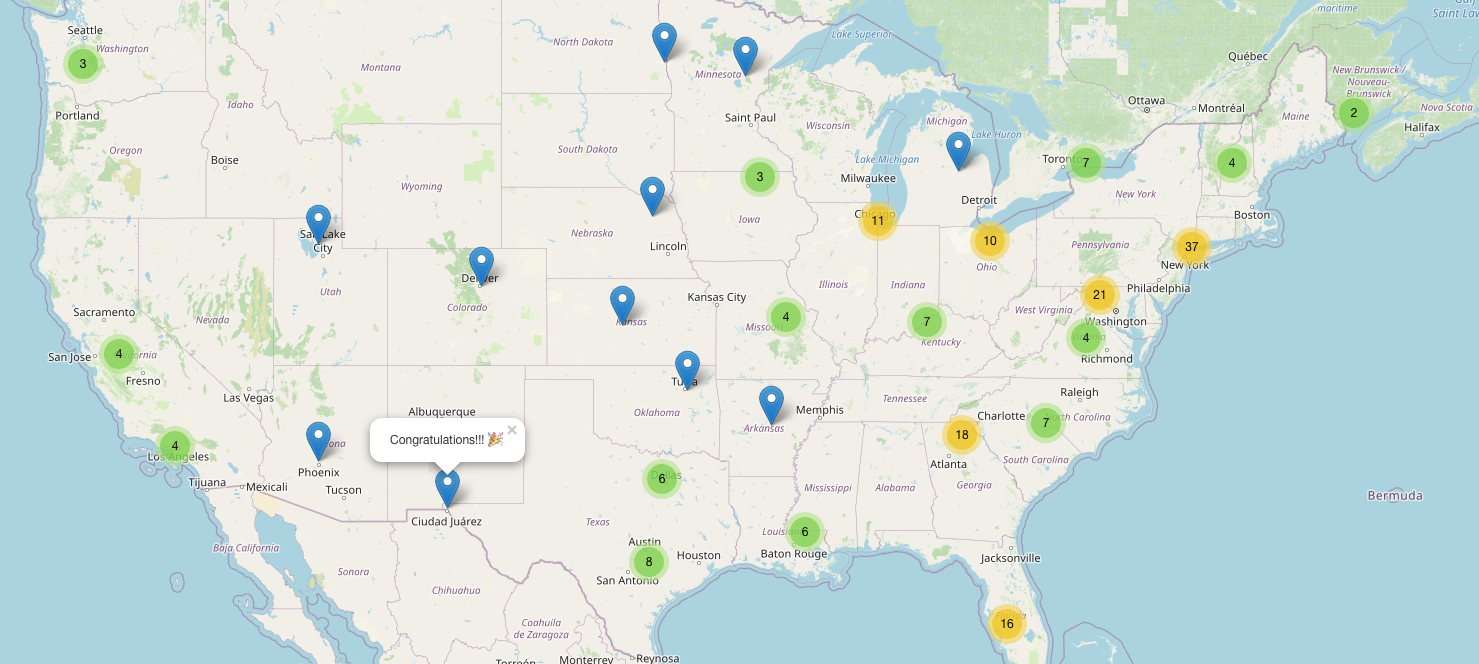The goal of Twitmo is to facilitate topic modeling in R with Twitter
data. Twitmo provides a broad range of methods to sample, pre-process
and visualize contents of geo-tagged tweets to make modeling the public
discourse easy and accessible.
You can install Twitmo from CRAN with:
install.packages("Twitmo")You can install Twitmo from GitHub with:
Before you install from Github make sure you have Rtools for Windows or macOS already installed.
## install remotes package if it's not already
if (!requireNamespace("remotes", quietly = TRUE)) {
install.packages("remotes")
}
## install dev version of Twitmo from github
remotes::install_github("abuchmueller/Twitmo")Make sure you have a regular Twitter Account before start to sample your tweets.
# Live stream tweets from the UK for 30 seconds and save to "uk_tweets.json" in current working directory
get_tweets(method = 'stream',
location = "GBR",
timeout = 30,
file_name = "uk_tweets.json")
# Use your own bounding box to stream US mainland tweets
get_tweets(method = 'stream',
location = c(-125, 26, -65, 49),
timeout = 30,
file_name = "tweets_from_us_mainland.json")A small sample with raw tweets is included in the package. Access via:
raw_path <- system.file("extdata", "tweets_20191027-141233.json", package = "Twitmo")
mytweets <- load_tweets(raw_path)
#> Found 167 records... Found 193 records... Imported 193 records. Simplifying...pool <- pool_tweets(mytweets)
#>
#> 193 Tweets total
#> 158 Tweets without hashtag
#> Pooling 35 Tweets with hashtags #
#> 56 Unique hashtags total
#> Begin pooling ...Done
pool.corpus <- pool$corpus
pool.dfm <- pool$document_term_matrixfind_lda(pool.dfm)model <- fit_lda(pool.dfm, n_topics = 7)lda_terms(model)
#> Topic.1 Topic.2 Topic.3 Topic.4 Topic.5 Topic.6 Topic.7
#> 1 job downtown music today tenrestaurant place like
#> 2 link knoxville team laurel paola life job
#> 3 bio democrats morning glen says time life
#> 4 click jeff season trailing puppy birthday beautiful
#> 5 see sessions early oaks us girlhappy posting
#> 6 meet like photoshoot tuscany crazy birthdaytasha olde
#> 7 people theres shamarathemodelscruggs ii covered church end
#> 8 can nothing allwomen design waffle today days
#> 9 recommend quite stay perfectly sooooo see grains
#> 10 anyone tn tuned sized church sunday sandor which hashtags are heavily associated with each topic
lda_hashtags(model)
#> Topic
#> mood 5
#> motivate 3
#> healthcare 1
#> mrrbnsnathome 5
#> newyork 5
#> breakfast 5
#> thisismyplace 6
#> p4l 6
#> chinup 5
#> sundayfunday 5
#> saintsgameday 5
#> instapuppy 5
#> woof 5
#> tailswagging 5
#> tickfire 1
#> msiclassic 3
#> nyc 1
#> about 1
#> joethecrane 1
#> government 5
#> ladystrut19 3
#> ladystrutaccessories 3
#> smartnews 2
#> sundaythoughts 6
#> sf100 3
#> openhouse 4
#> springtx 4
#> labor 1
#> norfolk 1
#> oprylandhotel 2
#> pharmaceutical 7
#> easthanover 1
#> sales 1
#> scryingartist 7
#> beautifulskyz 7
#> knoxvilletn 2
#> downtownknoxville 2
#> heartofservice 6
#> youthmagnet 6
#> youthmentor 6
#> bonjour 2
#> trump2020 7
#> spiritchat 5
#> columbia 3
#> newcastle 7
#> oncology 5
#> nbatwitter 6
#> detroit 1Check the distribution of your LDA Model with
lda_distribution(model)
#> V1 V2 V3 V4 V5 V6 V7
#> mood 0.001 0.001 0.001 0.001 0.996 0.001 0.001
#> motivate 0.001 0.001 0.995 0.001 0.001 0.001 0.001
#> healthcare 0.996 0.001 0.001 0.001 0.001 0.001 0.001
#> mrrbnsnathome 0.002 0.002 0.002 0.002 0.990 0.002 0.002
#> newyork 0.002 0.002 0.002 0.002 0.990 0.002 0.002
#> breakfast 0.002 0.002 0.002 0.002 0.990 0.002 0.002
#> thisismyplace 0.001 0.001 0.001 0.001 0.001 0.995 0.001
#> p4l 0.001 0.001 0.001 0.001 0.001 0.995 0.001
#> chinup 0.003 0.003 0.003 0.003 0.980 0.003 0.003
#> sundayfunday 0.003 0.003 0.003 0.003 0.980 0.003 0.003
#> saintsgameday 0.003 0.003 0.003 0.003 0.980 0.003 0.003
#> instapuppy 0.003 0.003 0.003 0.003 0.980 0.003 0.003
#> woof 0.003 0.003 0.003 0.003 0.980 0.003 0.003
#> tailswagging 0.003 0.003 0.003 0.003 0.980 0.003 0.003
#> tickfire 0.996 0.001 0.001 0.001 0.001 0.001 0.001
#> msiclassic 0.001 0.001 0.995 0.001 0.001 0.001 0.001
#> nyc 0.997 0.001 0.001 0.001 0.001 0.001 0.001
#> about 0.997 0.001 0.001 0.001 0.001 0.001 0.001
#> joethecrane 0.997 0.001 0.001 0.001 0.001 0.001 0.001
#> government 0.001 0.001 0.001 0.001 0.996 0.001 0.001
#> ladystrut19 0.001 0.001 0.996 0.001 0.001 0.001 0.001
#> ladystrutaccessories 0.001 0.001 0.996 0.001 0.001 0.001 0.001
#> smartnews 0.001 0.997 0.001 0.001 0.001 0.001 0.001
#> sundaythoughts 0.000 0.000 0.000 0.000 0.000 0.997 0.000
#> sf100 0.001 0.001 0.996 0.001 0.001 0.001 0.001
#> openhouse 0.000 0.000 0.000 0.998 0.000 0.000 0.000
#> springtx 0.000 0.000 0.000 0.998 0.000 0.000 0.000
#> labor 0.996 0.001 0.001 0.001 0.001 0.001 0.001
#> norfolk 0.996 0.001 0.001 0.001 0.001 0.001 0.001
#> oprylandhotel 0.001 0.996 0.001 0.001 0.001 0.001 0.001
#> pharmaceutical 0.001 0.001 0.001 0.001 0.001 0.001 0.996
#> easthanover 0.996 0.001 0.001 0.001 0.001 0.001 0.001
#> sales 0.996 0.001 0.001 0.001 0.001 0.001 0.001
#> scryingartist 0.001 0.001 0.001 0.001 0.001 0.001 0.996
#> beautifulskyz 0.001 0.001 0.001 0.001 0.001 0.001 0.996
#> knoxvilletn 0.001 0.995 0.001 0.001 0.001 0.001 0.001
#> downtownknoxville 0.001 0.995 0.001 0.001 0.001 0.001 0.001
#> heartofservice 0.002 0.002 0.002 0.002 0.002 0.985 0.002
#> youthmagnet 0.002 0.002 0.002 0.002 0.002 0.985 0.002
#> youthmentor 0.002 0.002 0.002 0.002 0.002 0.985 0.002
#> bonjour 0.001 0.995 0.001 0.001 0.001 0.001 0.001
#> trump2020 0.001 0.001 0.001 0.001 0.001 0.001 0.995
#> spiritchat 0.001 0.001 0.001 0.001 0.997 0.001 0.001
#> columbia 0.001 0.001 0.996 0.001 0.001 0.001 0.001
#> newcastle 0.001 0.001 0.001 0.001 0.001 0.001 0.997
#> oncology 0.001 0.001 0.001 0.001 0.996 0.001 0.001
#> nbatwitter 0.000 0.000 0.000 0.000 0.000 0.997 0.000
#> detroit 0.995 0.001 0.001 0.001 0.001 0.001 0.001Sometimes you can build better topic models by blacklisting or
whitelisting certain keywords from your data. You can do this with a
keyword dictionary using the filter_tweets() function. In this example
we exclude all tweets with “football” or “mood” in them from our data.
mytweets %>% dim()
#> [1] 193 92
filter_tweets(mytweets, keywords = "football,mood", include = FALSE) %>% dim()
#> [1] 183 92Analogously if you want to run your collected tweets through a whitelist use
mytweets %>% dim()
#> [1] 193 92
filter_tweets(mytweets, keywords = "football,mood", include = TRUE) %>% dim()
#> [1] 10 92Structural topic models can be fitted with additional external covariates. In this example we metadata that comes with the tweets such as retweet count. This works with parsed unpooled tweets. Pre-processing and fitting is done with one function.
stm_model <- fit_stm(mytweets, n_topics = 7, xcov = ~ retweet_count + followers_count + reply_count + quote_count + favorite_count,
remove_punct = TRUE,
remove_url = TRUE,
remove_emojis = TRUE,
stem = TRUE,
stopwords = "en")STMs can be inspected via
summary(stm_model)
#> A topic model with 7 topics, 137 documents and a 324 word dictionary.
#> Topic 1 Top Words:
#> Highest Prob: like, will, come, help, look, live, fun
#> FREX: hors, intellig, fun, come, enjoy, post, question
#> Lift: anytim, eddi, floyd, gameday, gave, hors, ranch
#> Score: stop, hors, will, come, like, help, anytim
#> Topic 2 Top Words:
#> Highest Prob: last, sunday, know, win, season, want, show
#> FREX: win, know, night, way, last, sunday, area
#> Lift: way, area, photo, three, night, win, boy
#> Score: area, last, win, sunday, night, know, action
#> Topic 3 Top Words:
#> Highest Prob: game, get, time, trump, can, just, love
#> FREX: game, love, week, al-baghdadi, parti, won, fuck
#> Lift: ’re, baghdadi, bin, counti, els, fail, import
#> Score: parti, game, love, trump, week, get, time
#> Topic 4 Top Words:
#> Highest Prob: one, day, today, open, church, even, life
#> FREX: church, rain, open, now, market, day, one
#> Lift: fat, finish, view, church, market, rain, special
#> Score: support, day, today, church, rain, open, one
#> Topic 5 Top Words:
#> Highest Prob: see, job, bio, link, click, might, best
#> FREX: job, bio, link, click, might, need, isi
#> Lift: bio, link, might, anyon, better, democrat, develop
#> Score: isi, bio, link, job, click, hire, recommend
#> Topic 6 Top Words:
#> Highest Prob: morn, place, first, read, team, bad, back
#> FREX: morn, place, colleg, lose, made, back, told
#> Lift: morn, place, back, championship, colleg, fall, famili
#> Score: made, morn, place, lose, found, colleg, huh
#> Topic 7 Top Words:
#> Highest Prob: think, say, school, feel, set, good, happen
#> FREX: feel, say, school, set, downtown, truth, anyth
#> Lift: anyth, benefit, excel, feel, talk, thank, yet
#> Score: feel, school, think, set, say, everyon, happenMake sure you have LDAvis and servr installed.
## install LDAvis package if it's not already
if (!requireNamespace("LDAvis", quietly = TRUE)) {
install.packages("LDAvis")
}
## install servr package if it's not already
if (!requireNamespace("servr", quietly = TRUE)) {
install.packages("servr")
}Export fitted models into interactive LDAvis visualizations with one
line of code
to_ldavis(model, pool.corpus, pool.dfm)
## for STM use (included in the stm package)
stm::toLDAvis(stm_model, stm_model$prep$documents)Plot your tweets onto a static map
plot_tweets(mytweets, region = "USA(?!:Alaska|:Hawaii)", alpha=0.1)or plot the distribution of a certain hashtag onto a static map (UK data not included)
plot_hashtag(uk_tweets, region = "UK", hashtag = "foodwaste", ignore_case=TRUE, alpha=0.2)Use scroll wheel to zoom into and out of the map. Click markets to see
tweets. Make sure you have the leaflet package installed.
## install leaflet package if it's not already
if (!requireNamespace("leaflet", quietly = TRUE)) {
install.packages("leaflet")
}
cluster_tweets(mytweets)

